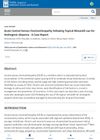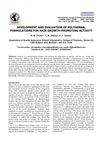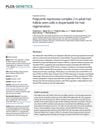 January 2023 in “TNOA journal of ophthalmic science and research”
January 2023 in “TNOA journal of ophthalmic science and research” Minoxidil may cause vision problems.
 September 2023 in “International Journal of Trichology”
September 2023 in “International Journal of Trichology” Adipose-derived stem cells may help with hair loss, but more research is needed.
 165 citations,
October 2013 in “Nature Communications”
165 citations,
October 2013 in “Nature Communications” Scientists made working salivary glands in mice using bioengineered cells, which could help treat dry mouth.
[object Object]  57 citations,
October 2013 in “international journal of endocrinology and metabolism”
57 citations,
October 2013 in “international journal of endocrinology and metabolism” Female pattern hair loss is common, linked to polycystic ovarian syndrome, and treated with topical Minoxidil.
 September 2023 in “International journal of medicine”
September 2023 in “International journal of medicine” AI is revolutionizing healthcare by improving diagnosis, treatment, and monitoring, but still needs close supervision.
 22 citations,
October 2019 in “International Journal of Nanomedicine”
22 citations,
October 2019 in “International Journal of Nanomedicine” The nanoparticles improved hair growth and enlarged hair bulbs.
 11 citations,
September 2020 in “OncoTargets and Therapy”
11 citations,
September 2020 in “OncoTargets and Therapy” Dihydrotestosterone increases growth and spread of human brain cancer cells, and blocking its formation might help treat this cancer.
 9 citations,
February 2011 in “Biologics: Targets & Therapy”
9 citations,
February 2011 in “Biologics: Targets & Therapy” Topical calcineurin inhibitors, especially 0.1% tacrolimus ointment, are effective and well-tolerated for treating cutaneous lupus erythematosus but require more research for standard treatment guidelines.
 38 citations,
July 2010 in “Clinical, cosmetic and investigational dermatology”
38 citations,
July 2010 in “Clinical, cosmetic and investigational dermatology” To treat tinea capitis in children, oral antifungal medication is necessary, with newer drugs offering shorter treatment times than the traditional griseofulvin.
 9 citations,
September 2019 in “Clinical, Cosmetic and Investigational Dermatology”
9 citations,
September 2019 in “Clinical, Cosmetic and Investigational Dermatology” Using a patient's own fat tissue helped treat hair loss caused by an injury.
 2 citations,
March 2021 in “Journal of Cosmetic Dermatology”
2 citations,
March 2021 in “Journal of Cosmetic Dermatology” Umbilical cord-derived media is safe and effective for hair growth.
 July 1980 in “Journal of The American Academy of Dermatology”
July 1980 in “Journal of The American Academy of Dermatology” The conference concluded that understanding hair and nail disorders is important, iron deficiency may be linked to hair loss, and while some treatments for skin conditions are effective, they may have risks and high costs.
 68 citations,
May 2018 in “PLOS Biology”
68 citations,
May 2018 in “PLOS Biology” Cyclosporine A may help treat hair loss by blocking a protein that inhibits hair growth.
 67 citations,
December 2019 in “PloS one”
67 citations,
December 2019 in “PloS one” Beta-caryophyllene helps improve wound healing in mice, especially in females.
 54 citations,
November 2015 in “Methods in enzymology on CD-ROM/Methods in enzymology”
54 citations,
November 2015 in “Methods in enzymology on CD-ROM/Methods in enzymology” Keratins are important for skin cell health and their problems can cause diseases.
 39 citations,
January 2019 in “The World Journal of Men's Health”
39 citations,
January 2019 in “The World Journal of Men's Health” Testosterone replacement therapy can prevent men from fathering children and should not be used by those wanting to stay fertile.
 29 citations,
February 2018 in “European Journal of Immunology”
29 citations,
February 2018 in “European Journal of Immunology” Regulatory T cells are essential for normal and improved wound healing in mice.
 24 citations,
May 2019 in “PLOS ONE”
24 citations,
May 2019 in “PLOS ONE” The African spiny mouse can fully regenerate its muscle without scarring, unlike the common house mouse.
 22 citations,
July 2019 in “PLOS ONE”
22 citations,
July 2019 in “PLOS ONE” Skin lymphatic vessels are essential for hair growth.
 22 citations,
January 2002 in “Treatments in endocrinology”
22 citations,
January 2002 in “Treatments in endocrinology” Birth control pills help treat skin and hair growth problems linked to high male hormone levels.
 21 citations,
December 2016 in “PLOS ONE”
21 citations,
December 2016 in “PLOS ONE” Scientists made skin stem cells from other human cells with over 97% efficiency, which could help treat skin conditions.
 20 citations,
December 2015 in “Journal of Pharmacopuncture”
20 citations,
December 2015 in “Journal of Pharmacopuncture” Thread-embedding therapy helped hair grow back in mice and might do the same in humans.
 17 citations,
October 2016 in “Artificial Cells Nanomedicine and Biotechnology”
17 citations,
October 2016 in “Artificial Cells Nanomedicine and Biotechnology” Using tiny fat particles to deliver arginine to hair follicles could be a new way to treat hair loss.
 15 citations,
June 2011 in “Journal of Ginseng Research”
15 citations,
June 2011 in “Journal of Ginseng Research” Korean Red Ginseng may improve skin condition and reduce allergy markers in atopic dermatitis patients.
 10 citations,
January 2016 in “PLOS ONE”
10 citations,
January 2016 in “PLOS ONE” Researchers found 44 proteins that change during different hair growth stages and may be important for hair follicle function.
 9 citations,
January 2009 in “International Journal of PharmTech Research”
9 citations,
January 2009 in “International Journal of PharmTech Research” The polyherbal oil with Eclipta alba, Hibiscus rosa sinensis, and Nardostachys jatamansi was found to be highly effective in promoting hair growth, better than minoxidil.
 7 citations,
October 2017 in “Artificial Cells Nanomedicine and Biotechnology”
7 citations,
October 2017 in “Artificial Cells Nanomedicine and Biotechnology” Finasteride-loaded ethosomes improve hair loss treatment by targeting pilosebaceous unit.
 6 citations,
December 2021 in “PLoS Genetics”
6 citations,
December 2021 in “PLoS Genetics” Polycomb Repressive Complex 2 is not needed for hair regeneration.
 6 citations,
June 2018 in “PLOS ONE”
6 citations,
June 2018 in “PLOS ONE” The Alopecia Areata Assessment Tool (ALTO) effectively identifies alopecia areata from other hair loss types but needs more validation.
[object Object]  5 citations,
January 2022 in “PloS one”
5 citations,
January 2022 in “PloS one” Deleting the p63 gene in certain cells causes problems in thymus development and severe hair loss in mice.






























